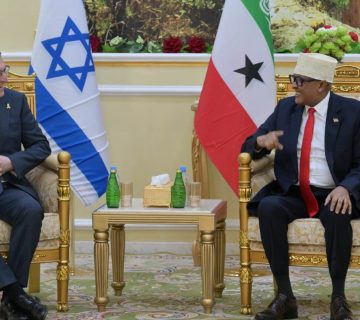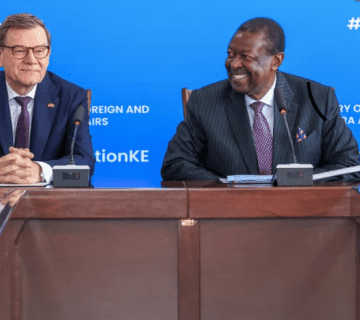Uganda’s 2021 presidential election promises to be a fascinating race. President Museveni, the incumbent who has been at the helm for more than 30 years will be confronted with new intricate realities ranging from disillusioned youth, a formidable challenger in Robert Kyagulanyi (alias Bobi Wine) to a wave of democratic aspiration sweeping across the continent. Sadly, Uganda’s previous electoral cycles have been characterized by violence and intimidation of opposition leaders. While this tactic has paid off in favor of President Museveni previously, it might no longer be a viable option and could plunge the country into chaos and violent confrontations. It is, therefore, critical that Museveni embraces best democratic practices to preserve the stability of the country come 2021.
New dynamics
The 2021 election will be the first to be held after a 2017 constitution review that saw parliament repeal age limit for presidential candidates that had been capped at 75 years. Without the amendment, President Yoweri Museveni would have been ineligible to vie. However, if the chaos that marred the amendment is anything to go by, then most Ugandans across the country were not on board with the process. Various media reports indicate that numerous Members of Parliament from the ruling party (National Revolution Movement, NRM) were violently attacked and chased away in their constituencies while trying to explain the rationale of the amendment to their constituents. The situation was similar inside parliament where physical confrontations ensued among members.
Second, unlike the past where Kizza Besigye was the only strong opposition candidate, Museveni now has the popular Bobi Wine, the Kyandodo East Constituency Member of Parliament (MP) cum pop star musician to contend with. Wine is popular with Uganda’s youthful population which has grown weary of Museveni’s rule. According to the World Bank, 75 per cent of Uganda’s population is below 30 years. A 2019 opinion poll by the Research World International (RWI) found that 62 per cent of Ugandans aged 18-29 felt that the country is headed in the wrong direction with many citing a dysfunctional economy as their reason. This group has seen Uganda under only one president and might want to see a change.
Third, Uganda’s opposition is becoming more persistent and radical in its demands for reforms. Bobi Wine with the support of the youth has injected new energy into the opposition. In 2018, Wine led his supporters to demonstrate against the social media tax that had been imposed. He has also engaged the police in running battles on several other occasions. Wine was elected to parliament as an independent candidate but he has managed to portray himself as revolutionary. He has established a strong political movement dubbed ‘people power’; a non-conventional way of doing politics in Uganda.
Fourth, the election will come at a time when citizens in several countries in Africa have been successful in their attempts to get rid of presidents who had manipulated electoral systems to ensure their continued stay in power. For instance, in Sudan, a protest sparked by dissatisfaction with high inflation grew into an anti-regime movement which eventually led to the removal of former President Omar Bashir from power on May 1, 2019. Just like Museveni, Bashir was a strong man who ascended to power through a military coup in 1989 and had highly militarized the state including the use of militias. In Algeria, there were mass protests against President Abdelaziz Bouteflika who had declared his intention to vie for a fifth presidential term. The legendary leader was forced to vacate office. In Zimbabwe, the late President Robert Mugabe was forced to resign in 2017 to avoid an impeachment initiated by his own party.
Use of violence
President Museveni has not shied away from using excessive force against his opponents. The recent dramatic arrest of Kizza Besigye, his perennial opponent, is hardly a new occurrence. Besigye has on many occasions been violently arrested, beaten up, placed under house arrest or charged with treasons among other things. His campaigns and public rallies have been stopped by the police countless times even when he had notified them as required by law. After the 2016 elections, together with other opposition leaders, he was placed under house arrest for several weeks despite a strong local and international demand for his release. The police said his detention was a ‘’preventive measure’’ to stop an escalation of violence in the country.
Bobi Wine, a new entrant in Uganda’s politics, has not been spared either. In 2018, Wine was arrested and tortured on grounds of ‘’stoning the presidential motorcade’’ in Arua where both Wine and Museveni were campaigning for their candidates in a parliamentary by-election that Wine eventually emerged victorious. This was even before Wine declared his intentions to challenge Museveni in 2021. Wine has also had his music concerts, a total of 156, canceled by the police at the last minute on flimsy grounds. This could be Museveni’s government’s strategy –to stifle him economically and deny him an opportunity to galvanize his supporters through music.
The use of violence to retain power is no longer a viable option in Uganda. Upsetting images of police using excessive force against unarmed leaders sends a message to Ugandans that force is the only way to get what you want. It also taints the image of the country on the international stage and scares off foreign investors and tourists who may be interested in Uganda.
To ensure that peace prevails and Uganda remains stable before and after the 2021 elections, President Museveni needs to embrace the ideals of functioning multi-party democracies and allow parties to organize and carry out their activities freely without unnecessary bureaucratic obstacles and harassment by security forces. The African Charter on Democracy, Elections, and Governance, which Uganda is a signatory, demands that state parties strengthen political pluralism and recognize the role, rights, and responsibilities of legally constituted political parties. International Covenant on Civil and Political Rights (ICCPR) also recognizes the right to peaceful assembly and association.
More so, the African Union (AU) and other international partners should go beyond mere statements and engage Museveni directly on the need to respect political rights in Uganda.
Elvis Salano is a Research Assistant at the HORN Institute.
Photo: President Museveni (right) gives a thumps up to supporters at a past political rally (Photo Credit: NaijaNews)



